Book contents
Summary
Introductory: The Tendencies of the Age
Before we can deal adequately with any one type of dramatic productivity of this time, we must to some extent analyse the general movements of the age as they affected tragedy and comedy in common. Already has been noted the political element, which was, undoubtedly, of prime importance in the shaping of particular dramatic situations and characters. Noted, too, has been the disintegrating influence of pantomime, opera and farce. For our purpose, however, probably the most important movement of the time was that to which has been given the name of pseudo-classical, and which found noble dramatic champions in John Dennis, Joseph Addison and Charles Gildon. It was this century which saw the crystallisation of that body of “rules” so ridiculously enunciated by Rymer some twenty years before. It was this century, too, which witnessed, in Cato, the triumph of the classical tragedy. It cannot be denied that the classical theories put forward by Dennis and Gildon bore fruit in this time, or that they deeply influenced the tragic productivity of the stage. The critics declared for Aristotle's rules as interpreted by France, and to a certain extent they imposed their authority. There were only one or two writers bold enough to hazard even a hint that the terrible Unities were not fundamentally essential.
- Type
- Chapter
- Information
- History of English Drama, 1660–1900 , pp. 51 - 124Publisher: Cambridge University PressPrint publication year: 1952



